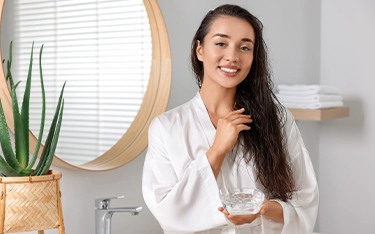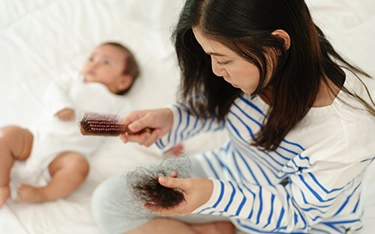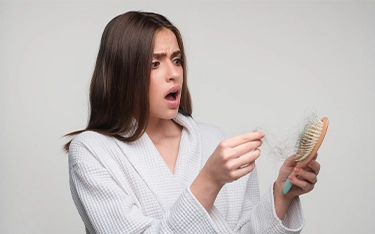FAQs
Yes, you can safely apply pure aloe vera gel directly to your hair and scalp. In fact, this is the most effective way to harness its natural benefits. Aloe vera works as a lightweight, non-greasy conditioner that smooths the hair cuticle and hydrates the scalp.
- For scalp: Massage fresh aloe vera gel into the roots for 15–20 minutes. This nourishes follicles, unclogs pores, and improves circulation.
- For hair strands: Apply along the length of damp hair to reduce frizz and dryness.
Expert tip: Always use fresh aloe vera gel or a trusted, chemical-free product. Avoid commercial gels with alcohol or artificial fragrances, as these can dry out the hair.
Yes. Aloe vera is a natural dandruff remedy thanks to its antifungal, antibacterial, and anti-inflammatory properties. The gel targets dandruff in three ways:
- Controls Malassezia yeast – the fungus often responsible for dandruff.
- Soothes scalp irritation – reduces itching, burning, and redness.
- Gently exfoliates – its natural enzymes help remove flakes without harsh scrubbing.
In mild to moderate dandruff, regular aloe vera scalp massages (2–3 times weekly) can significantly reduce flakes. However, chronic dandruff linked to conditions like seborrheic dermatitis or psoriasis may need professional evaluation.
Yes, aloe vera is one of the few natural remedies suitable for all hair and scalp types.
- Dry hair: Provides deep hydration and prevents brittleness.
- Oily scalp: Balances sebum production without stripping natural oils.
- Curly or frizzy hair: Defines curls and reduces flyaways.
- Color-treated or chemically treated hair: Soothes damage, restores shine, and prolongs treatment results.
Its balancing effect is what makes it universally adaptable—it hydrates without being heavy, cleanses without being harsh, and strengthens without buildup.
For most people, leaving aloe vera overnight is safe and beneficial. It acts as an intensive leave-in conditioner while you sleep, restoring lost moisture and adding shine.
However, there are a few precautions:
- Perform a patch test on your scalp/skin before using overnight.
- Use a thin layer to avoid stickiness or buildup.
- Cover your pillow with a towel, as aloe can feel slightly wet or tacky.
If you have a sensitive scalp, it’s best to limit application to 20–30 minutes during the day to avoid irritation.
The difference lies in application and purpose:
- Aloe vera gel (applied topically): Works directly on the scalp and hair strands. It moisturizes, reduces dandruff, strengthens follicles, and adds shine.
- Aloe vera juice (taken internally): Supports hydration, digestion, and nutrient absorption. Since healthy hair often begins inside the body, aloe juice indirectly supports stronger, healthier hair growth.
Expert advice: Always consult a doctor before consuming aloe vera juice, as excessive intake can cause digestive issues. For direct hair care, gel is the most reliable form.
Consistency is key. For general hair care, applying aloe vera 2–3 times a week is ideal. Results vary depending on your concern:
- Dry hair: Noticeable softness within 2–3 uses.
- Dandruff: Flake reduction within 3–4 weeks of consistent application.
- Hair growth: Thicker, healthier strands may take 8–12 weeks to show visible improvement, as hair grows slowly in cycles.
At Dr Batra’s®, we often pair aloe vera with individualized therapies, ensuring faster and more sustainable results by treating the root cause of the problem.
Yes. Aloe vera improves hair elasticity and tensile strength by delivering amino acids and antioxidants to hair shafts. This reduces breakage caused by brushing, styling, or dryness.
While aloe vera cannot “heal” split ends (the only permanent solution is trimming), it can:
- Prevent further splitting by sealing in moisture.
- Smooth frayed cuticles for a healthier look.
- Reduce the frequency of trims needed by minimizing new damage.
Home remedy: Mix aloe vera gel with a few drops of argan or almond oil. Apply to the ends of your hair for a natural split-end prevention serum.
Aloe vera supports hair growth by:
- Stimulating blood flow to dormant follicles.
- Delivering nutrients directly to the scalp.
- Reducing inflammation that weakens follicles.
However, hair thinning can have multiple triggers—genetic, hormonal, nutritional, or stress-related. Aloe vera works best as part of a comprehensive plan. At Dr Batra’s®, homeopathy clinic in Dubai, we combine aloe vera care with homeopathy to address internal causes of hair loss, ensuring better regrowth outcomes.
Absolutely. Aloe vera is highly versatile and blends well with natural ingredients:
- Coconut oil + Aloe vera: Deep conditioning for dry hair.
- Castor oil + Aloe vera: Stimulates hair growth.
- Honey + Aloe vera: Locks in shine and hydration.
- Lemon juice + Aloe vera: Controls oiliness and dandruff.
Always mix in small quantities and do a patch test to ensure no reactions.
In general, aloe vera is safe, non-toxic, and free of harsh chemicals. Most people experience no side effects even with regular use.
Rarely, individuals with sensitive skin or allergies may notice:
- Mild redness
- Itching
- Tingling sensation
To avoid this:
- Always test a small amount on your wrist or scalp before full application.
- Rinse thoroughly if any irritation occurs.
- Stick to pure aloe vera gel, avoiding products with synthetic additives.
At Dr Batra’s®, we often recommend aloe vera as part of a long-term care routine precisely because of its gentle, safe profile.




